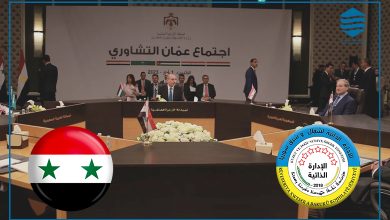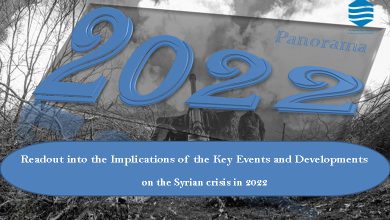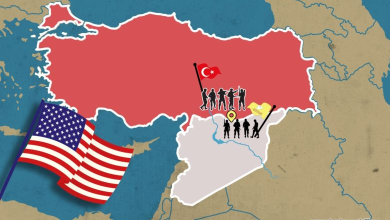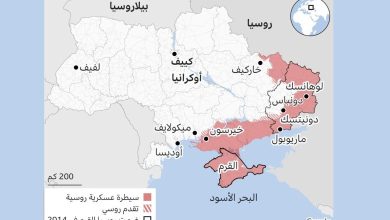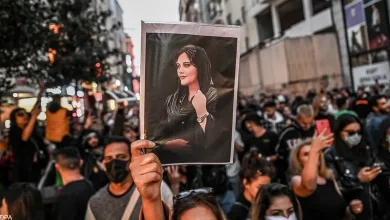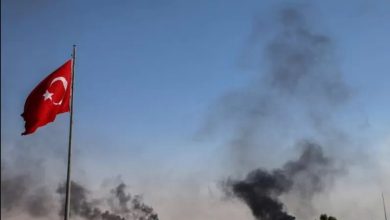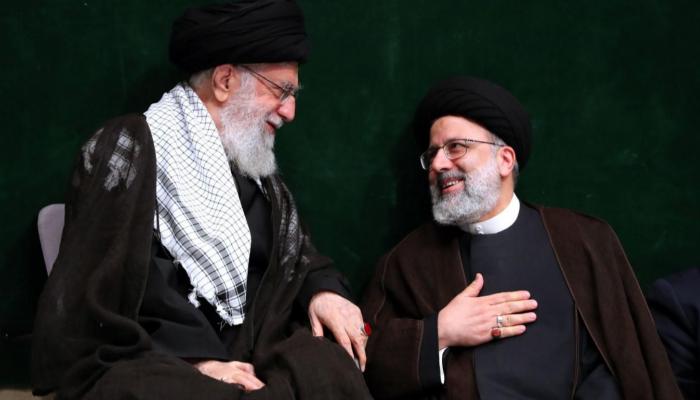
Do the Fundamentalist Taking Over Power in Iran Affect its Policy and its Nuclear File?
Al-Furat Center for Studies- Translation Department
Also Available in (arabic)
The Iranian presidential elections that took place on 18 June, resulted in the victory of the fundamentalist candidate, Ibrahim Raisi, with 48.8% of the nearly 60 million Iranians eligible votes, according to what was announced by the Iranian Minister of Interior, “Abdul Reza Fazli” the day after holding the elections. An election that many Iranian people describe as “humiliating engineered elections,” due to the lack of any real competition, especially after the exclusion of the reformists by the Expediency Discernment Council, which is controlled by hardliners, and which has the final decision in determining The eligibility of the candidates.
This percentage – obtained by Raisi – is the lowest in the history of the Islamic Republic of Iran since its inception in 1979, in which the lowest rate of participation in the presidential elections was in 1993, during the presidency of Akbar Hashemi Rafsanjani, and it amounted to 50.66%.
Perhaps what is remarkable about these elections is the percentage of invalid votes, which amounted to 3.7 million votes, which are white papers submitted by voters to cast their votes, because they are employees of government circles, and they fear security prosecutions.
These elections come in light of difficult conditions that Iran is experiencing at home, due to the deteriorating economic and living conditions, the great repercussions that the Corona pandemic has left in the country, the weakness of President Hassan Rouhani’s government in addressing and handling them. Moreover, the state of great popular resentment against the practices of the Iranian regime, which is based on radical religious faith foundations, which cracks down on every tendency to liberalization and reform, and does not pay the slightest attention to the condition of Iranian citizens. What reinforced this situation among large segments of Iranian society is the bloody repression that protesters were subjected to in the gasoline uprising in late 2019. The Revolutionary Guards shot down the Ukrainian plane, in which dozens of Iranian students died, and the ruling regime in Iran evaded its responsibilities towards this incident. In addition to the problem of the nuclear file, which destabilized the Iranian economy, following the withdrawal of the United States from it in May 2018.
What is the importance of electing Raisi at this stage?
Despite of the fact that major and strategic issues are in the hands of the Supreme Leader, Ali Khamenei personally, the arrival of a hard-liner president, who is aligned with the core ideology of Wilayat al-Faqih will strengthen the grip of the conservative current represented by Khamenei. This closes the door to any opinion that differ from his vision, especially in the nuclear file and dealing with the inside. It also allows the conservatives to impose their vision within the institutions of the government, which enjoyed a margin of contrast with the vision of the leader during the era of the reformists. Even though it lacks influence, it does not go beyond the framework of condemnations and statements, as happened during the crackdown of the gasoline protests, when many MPs condemned the repressive practices of the Iranian security forces against the demonstrators.
The preparations have been made to strengthen the hardliners’ grip on all aspects of government in Iran, through their control of the three authorities in the country. Hence, the complete union between the institutions of the government, the parallel institutions run by the deep state led by the Supreme Leader, the Revolutionary Guards, and the religious institution. They have the decisive decision on sensitive internal issues, and in drawing the outlines of the country’s foreign policy. This is what was revealed by the leaked conversation of Javad Zarif in his dialogue with one of President Hassan Rouhani’s advisors, where he clarified the main role of the Revolutionary Guards in drawing foreign policy, especially the late General Qassem Soleimani. What reinforced this tendency of the Supreme Leader is the escalation of the successive demonstrations in Iran, starting with the Green Movement in 2009, to the gasoline protests in 2019.
It seems that the current stage, which the Islamic Republic is going through from the Supreme leader’s point of view, needs to pursue escalation to the highest levels in countering the American escalation. They aiming at reformulating the nuclear agreement, and try to fill in the gaps in it, since the Obama era; curbing Iran’s role in the region and its missile and space program, which has become a concern of the international community in general, and America’s allies in particular, especially the Gulf states and Israel.
Accordingly, the appointment of Ibrahim Raisi, who is on the US and European sanctions lists, who is considered by the Iranians to have a black record in the human rights file, and he is responsible for the execution of thousands of opponents and political prisoners after the victory of the Islamic Revolution, carries several escalating messages at various levels. This is considered an escalating response to the sanctions imposed on Iran because of its committed violations in the human rights file, on the one hand. It is also considered a message to the Iranian interior as well, and a covered threat to the people, whose longing ember for freedom and liberation from the Islamic regime is still burning under the ashes.
On the other hand, Raisi’s hold of the “presidency position” in Iran is an indication of Iran’s continued support for its militias in the countries of the region, and the creation of a state of confidence and security in them, especially since Raisi was managing the “Shrine Razavi” in the city of Mashhad in 2016. One of the richest religious organizations in the Islamic world, with a budget of billions of dollars, and a prominent role in mobilizing individuals, groups, and fundamentalist currents loyal to the regime of the Islamic Republic, and providing them with significant financial and logistical support.
The position on the Vienna talks
Although the hardliners in Iran opposed to seal any kind of agreements with the West and the United States, due to its lack of confidence in these powers on the one hand. Therefore, reaching an agreement would not be a success for the reformists on the other hand. The political pragmatism enjoyed by the Iranian regime will make it pursue reaching to an agreement in this file, to strengthen its power and save the country from the danger of major repercussions and economic stagnation resulting from the maximum sanctions imposed by the Trump administration. Nevertheless, the agreement does not necessarily mean that Iran will comply with all the conditions imposed on it by the previous US administration.
Iran refuses absolutely to reformulate the agreement, and to include new items that it considers incompatible with the agreement sealed during the Obama administration, the most important of which are: the ballistic missile file, Iran’s interference in the region, and the involvement of America’s regional allies in the new agreement, especially Israel and Saudi Arabia. In addition, refraining from lifting all sanctions imposed on Iran, and only lifting parts of them, which are related to the Iranian economy, such as the oil and banking sectors, and shipping.
Iran seeks to get the United States to lift the largest number of sanctions, which go beyond economic issues, to the sanctions imposed on the leader’s house, his relatives, and dozens of people around him. In addition to its demand to remove the Revolutionary Guards from the US terrorism list and demanding from the United States to write a written pledge to ensure that it does not withdraw from the nuclear agreement once again, and this request is faced with great difficulties in obtaining the approval of the US Senate in this regard.
The US special envoy to Iran, Robert Malley, stressed that the United States does not have to lift all the sanctions that were imposed on Iran during President Trump’s tenure, and the US is ready to leave the talks, if the agreement does not serve its main interests. He indicated that Ibrahim Raisi’s hold of power in Iran would not affect the progress of the nuclear agreement talks. According to their assessments, there is no difference between who will rule in Iran, because they do not trust any of them and the most important issue for them is reaching an agreement, which would remove the risk of Iran’s possess of the nuclear bomb.
In his first press conference, which took place on Monday 21 June, the Iranian president-elect affirmed his commitment to the nuclear agreement in case that the US side committed to lifting sanctions. He indicated that Iran was not opposed to reaching an agreement in this file, but he also stressed on Iran’s objection of including the ballistic missile file, and support for Iran’s allies in the region within the agreement.
Thus, it appears that the escalation that Iran has pursued in reducing its nuclear commitments, bringing the rate of uranium enrichment to 60%, and declaring the cancellation of the Additional Protocol that prohibits the International Atomic Energy Agency’s inspectors from accessing nuclear facilities, closing surveillance cameras there. In addition to Iran’s refraining, to provide the agency with videos that monitor the activities inside these facilities, the use of advanced centrifuges for uranium enrichment. In addition to the activation of the Arak heavy water reactor, all of this poses a source of concern for the signatories to the agreement. This leads them to give priority to reaching an agreement on the nuclear file, and to prolong Iran’s possess of the nuclear bomb, and this was also confirmed by the US Secretary of State, Anthony Blinken, when he said: “Our national interest dictates that we restore Iran’s nuclear program to the box it was in.”
The new US administration is well aware of the danger of possessing nuclear weapons, and its impact on its security and the security of its allies in the region, and what would result in nuclear arms competition. It will do everything within its power to control this great threat, and put it back under the scrutiny of the international community as it was in 2015.
Experts, including Joe Cirincione, a senior researcher at the Quincy Institute, believes that the US administration will seek to return to the nuclear agreement, which it considers the number one threat, and after containing it, it will start talking about other issues, such as Iran’s missile program and its interventions in the region.
In any case, as long as the United States excludes the military option against Iran, given the seriousness of what will result from such an option, and the possibility of a large-scale war that includes the entire region. Therefore, the United States will focus on reaching out an agreement through diplomatic means, despite of developments indicate increased obstacles to reach an understanding. Especially after Iran did not extend the temporary agreement with the International Atomic Energy Agency, which expired last month, an agreement that under which the Agency was allowed to get access to information about nuclear facilities, which will jeopardize the negotiations, according to Western diplomats.
The Israeli stance on the course of events
Ibrahim Raisi’s hold of the executive authority in Iran has raised the concerns of Israel, given that it considers him the extreme Iranian president so far. Because of his position in support of Iran’s possession of nuclear weapons, and his absolute support for Iran’s activity in the region, which targets Israel in the first place via the Iranian-backed militias that Iran continues to expand its areas of control in the region. Besides, its support with precision missiles and modern drones, thus constitute a permanent threat to Israel.
Although Israel is an outside party the nuclear agreement and Iran’s strongly refusal to include it in any new agreement, it remains a strong actor in Iran’s nuclear file, and it dictates all its powers to prevent Iran from possessing a nuclear bomb, given that it will be the most affected party in if something like that happens.
Therefore, we find that Israel is intensifying its confrontation to Iran’s nuclear project, through its intelligence capabilities inside Iran, and its “penetration into the heart of the Iranian regime,” according to the words of the Israeli Mossad chief Yossi Cohen at his farewell ceremony. It is also attributed to the Mossad, the elimination of the father of the Iranian nuclear project, “Fakhrizadeh” and other nuclear scientists, and its involvement in the series of explosions and mysterious attacks on vital facilities and sensitive nuclear sites in Iran. The last of which was last month, when a small drone targeted Iran Centrifuge Technology Company near Tehran, the capital, and it inflicted severe damage on it, and this institution was among the objectives set by Israel for the Trump administration in early 2020. Perhaps what is remarkable about this targeting is the likely take-off of the drone that targeted the building from Inside Iran, and from “a spot not far from the site of the attack,” according to what was reported by the New York Times. If this prediction is correct, it reveals the extent of Israel’s penetration into the most sensitive centers and points in Iran.
The Israeli determination to confront Iran’s project in the region has been manifested in intensively targeting Iranian sites inside Syrian territory, and seeking to expand the scope of normalization agreements with Arab countries in order to form a regional alliance that limits Iranian control in the countries surrounding Israel and threatens its security. However, it seems that Iran also has cards to obstruct the formation of such an alliance. Throughout igniting the crisis between Hamas and Israel in May of this year, and inciting the feelings of the Arab people towards the Palestinian cause and pitting them against Israel, can be considered one of Iran’s cards to obstruct the path of the “Abraham Accords” for peace.
There are indications that there are differences in visions between the United States and Israel regarding getting back to the nuclear agreement. Israel has always opposed this agreement, since it was signed during the era of former US President Barack Obama. It has constantly threatened to launch pre-emptive strikes on Iranian nuclear facilities, which it would be useless according to the data that show the strong fortifications of these sites, and the risk of anonymous consequences of a war in the region. Moreover, there is another important risk, which is pushing Iran to withdraw from the Treaty on the Non-Proliferation of Nuclear Weapons, which it signed during the reign of Shah Muhammad Reza Pahlavi in 1968. Given that one of the provisions of this treaty allows Iran to withdraw from it officially in case of its national security is exposed to an external threat; this pushes it to practice its nuclear activities freely and to develop secretly, away from the eyes of the international community, subsequently, Iran would become another North Korea.
However, despite all the tactical differences between the United States and Israel, with regard to the Iranian threat. There were several extensive meetings that took place between Israeli and American officials, to emphasize the importance of the relationship between their both countries, and their sharing of a fundamental goal, which is to prevent Iran from obtaining nuclear weapons, and to limit its role in the region. After a series of meetings held by the Chief of the general Staff of the Israeli Defense Forces(IDF), Aviv Kochavi with the leaders of the American army, senior officials in research institutes and those who have influence on the public opinion. Kochavi made it clear that the military cooperation between the Israeli and the American army has reached a qualitative and exceptional phase in coordination to meet their common challenge in the region, which is Iran.
In this context, the United States and Israel agreed, last month, to form a special committee to confront the escalating threats of drones and guided missiles supplied by Iran to its proxy groups. During these discussions, Israel presented a proposal to establish a no-fly zone to prevent Iranian drone attacks.
The need for a solution
It is imperative for Iran and the United States to get back the nuclear agreement revival for two reasons:
1- The conservative movement in Iran, despite its extremist stance towards the West and the United States, reaching out an agreement will be a success to defuse the crisis, lifting sanctions on Iran, and trying to convince the Iranian interior of the importance of this tendency. This constitutes the structure of the Islamic Republic’s regime, to resolve the country’s affairs, revitalize its economy, and return it to the path of global diplomacy, in addition to supporting its arming projects, reassuring its proxy groups, strengthening their convictions and loyalty to Iran, and to get enough money to continue funding these groups.
2- The United States is interested in reaching an understanding with Iran, to ensure that Iran does not possess nuclear weapons on the one hand, and this understanding would be the beginning of other understandings about other Iranian military activities, on the other hand. This also poses a great danger in the region, and this would be a step towards getting closer to Iran at the expense of the latter’s relationship with Russia and China, with whom Iran is allied in an anti-American axis.
In conclusion, it can be said that reaching this agreement will not be without obstacles, and the escalation will move from the negotiating table to an escalation on the ground every now and then. Perhaps the recent American bombardment of Iranian militia sites in Iraq and Syria, and the latter’s response by bombing the American base near Al-Omar oil field in Deir ez-Zor is the beginning of this escalation. It will take place in a deliberate and calculated manner, and on a limited scale by each party, in order to push the other to comply with its terms in the negotiations. These negotiations are likely to end up in adding some technical provisions to the agreement in the end, which in its turn will maintain Iran’s nuclear program at the peaceful limit for a longer period.
